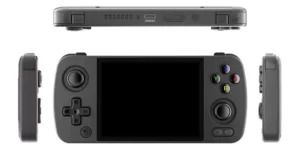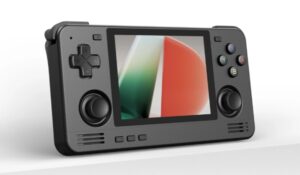In the realm of mobile gaming, Android gaming handhelds are carving out a significant niche, offering gamers a unique blend of traditional handheld console vibes and the vast, versatile world of Android apps and games.
These devices, which combine the physical controls and hardware of a gaming console with the software and functionality of an Android device, are redefining what it means to game on the go.
Android Handhelds
| Name | Chipset | RAM | Storage | Display | Battery | |
|---|---|---|---|---|---|---|
 | AYANEO Pocket S | Qualcomm Snapdragon G3x Gen 2 processor | Up to 16GB | Up to 1TB | 6″ 2K (2560 x 1440 pixels) IPS LCD touchscreen | |
 | AYN Odin 2 MAX | Snapdragon 8 Gen 2 | 16GB | 512GB | 6” IPS LCD touch screen,1080 × 1920 pixels FHD+ | 8000 mAh |
 | AYN Odin Pro | Qualcomm Snapdragon SD845 | 8GB | 128GB/256GB | 5.98″ IPS LCD, 1080×1920 resolution | 6600 mAh |
 | Retroid Pocket 4 Pro | Mediatek Dimensity 1100 | 8GB | 128GB | 4.7″ Touch Screen, 750×1334 Resolution | 5000mAh |
 | AYANEO POCKET AIR | MediaTek Dimensity 1200 | 6GB/8GB/12GB | 128GB/256GB/512GB | 5.5″ 1080P AMOLED | 7350mAh |
 | ANBERNIC RG556 | Unisoc T820 | 8GB | 128GB | 5.48-inch AMOLED screen, 1920×1080 resolution | 5500mAh |
 | ANBERNIC RG405M | Unisoc Tiger T618 | 4GB | 128GB | 4-inch IPS touch screen, 640*480 resolution | 4500 mAh |
 | Retroid Pocket 2S | Unisoc T610 | 3GB | 32GB | 3.5 inch IPS screen, 640 x 480 pixels, touchscreen | 4000mAh |
 | Retroid Pocket Flip | Unisoc T618 | 4GB | 128GB | 4.7 inches, 1334 x 750px, 450 nits, touchscreen | 5000 mAh |
 | Razer Edge | Snapdragon G3x Gen 1 | 8GB | 128GB | 6.8-inch AMOLED, FHD+ (2400×1080 pixels), 144Hz refresh rate | 5000mAh |
Why Android Gaming Handhelds?
If you want to play PC games, look into a pc handheld.
- Versatility and Variety: The primary draw of Android gaming handhelds is their ability to blend the expansive library of Android games with the tactile feedback of physical buttons and joysticks. Unlike traditional mobile gaming on smartphones, these devices are designed with the gamer in mind, offering ergonomic designs and dedicated gaming controls. From indie hits to mobile mainstays, the variety of games available on the Android platform is unparalleled.
- Performance and Portability: These devices pack enough hardware power to run games smoothly, often featuring processors and graphics chips found in high-end smartphones. Coupled with their compact, portable designs, they provide a superior handheld gaming experience without the need to lug around multiple devices.
- Customization and Control: Android’s open nature allows for extensive customization, from UI tweaks to performance settings. Gamers can optimize their devices for the best gaming experience, including mapping controls for games not originally designed for physical buttons.